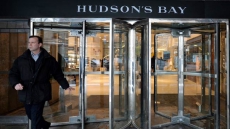OTTAWA — Federal officials have told Prime Minister Justin Trudeau that Canada's strategic interest would be well served by strengthening economic ties with oil-rich Saudi Arabia because of its powerful position in the Persian Gulf.
That advice sheds light on why the Liberals are rejecting calls to cancel a $15-billion sale of armoured vehicles to Saudi Arabia following its execution last weekend of 47 people, including a prominent Shiite cleric.
Trudeau has also been advised to anticipate the easing of possible sanctions against Iran in the coming months if progress is made on implementing last year's landmark nuclear agreement between Tehran and six countries, including the United States — a prospect that seemed imminent on Thursday.
The assessments are contained in Trudeau's briefing book, a copy of which was obtained by The Canadian Press under Access to Information.
The execution of Sheik Nimr al-Nimr has sparked tension between mainly Sunni Saudi Arabia and Shiite Iran and heightened fears of direct conflict between the two countries.
Canada's interests in the tumultuous region are spelled out in the briefings prepared for Trudeau, who faces calls to cancel the lucrative sale of light armoured vehicles by an Ontario company.
"Further deepening of strategic relations with the Gulf Co-operation Council (GCC) countries would serve Canadian commercial and possibly security interests," the memo states, pointing to Saudi Arabia as the leading player in the six-country bloc that includes the United Arab Emirates, Bahrain, Kuwait, Oman and Qatar.
"Current bilateral engagement includes a particular focus on Saudi Arabia and the UAE," it says. "Saudi Arabia is a regional power, the only Arab country in the G20. It is a key contributor to global energy security and Canada's largest trading partner in the region."
The memo says there are trade and investment opportunities for Canada in the Gulf region because its economies are "diversifying into areas of Canadian strength, including financial, education, health care services, agriculture, as well as infrastructure."
The censored version of the memo makes no mention of human rights, including the case of imprisoned Saudi blogger Raif Badawi, whose wife now lives in Quebec.
But a section on how Canada can support "gradual, consensual political and social reforms" in the region is almost entirely blacked out.
In December, Foreign Affairs Minister Stephane Dion met his Saudi counterpart and urged clemency for Badawi, who has been sentenced to a thousand lashes and 10 years in jail for his criticism of Saudi clerics.
Days ago, Dion called on the Saudi Arabian government to "protect human rights, respect peaceful expressions of dissent and ensure fairness in judicial proceedings" following the 47 executions.
Alex Neve, the head of Amnesty International Canada, said Dion's comment was, "a bit out of the ordinary in terms of how willing previous governments have been to speak out about human rights concerns in Saudi Arabia. Now what we need to see is that that be matched by some serious human rights focus to the arms deal."
A spokesman for Dion said the arms deal between the Saudis and General Dynamics Land Systems Canada would not be cancelled because it has the proper export permit. Canada's export-control regime is "carefully reviewed and that human rights considerations are seriously taken into account before a permit is issued," said Adam Barratt.
During the recent federal election campaign, former prime minister Stephen Harper and Trudeau both backed the deal.
Dion also said last weekend that Canada is concerned the execution of Sheik al-Nimr could "further inflame" sectarian tensions in the region.
Fen Hampson, an international security expert with Canada's Centre for International Governance Innovation, said the rupture of relations between Saudi Arabia and Iran, the two dominant Islamic powers in the region, could escalate to direct military confrontation beyond the current proxy wars they are fighting in Iraq, Syria and Yemen.
"It does not augur well for the region's political stability, which has been exacerbated by deep-rooted Saudi concerns about the implementation of the nuclear agreement with Tehran," he said.
On Thursday, U.S. Secretary of State John Kerry said Iran could be days away from fulfilling its end of that deal, which compels Tehran to scale back technology that could be used to make a nuclear weapon.
If that occurs, western countries, including Canada, would be compelled to lift United Nations sanctions against Iran.
"Canada will have to withdraw or modify the UN Iran Regulations ... as early as winter 2016 and as late as summer 2016," says Trudeau's briefing book.
Trudeau has pledged to reopen Canada's embassy in Iran and re-establish diplomatic relations, but has yet to formally announce that.






